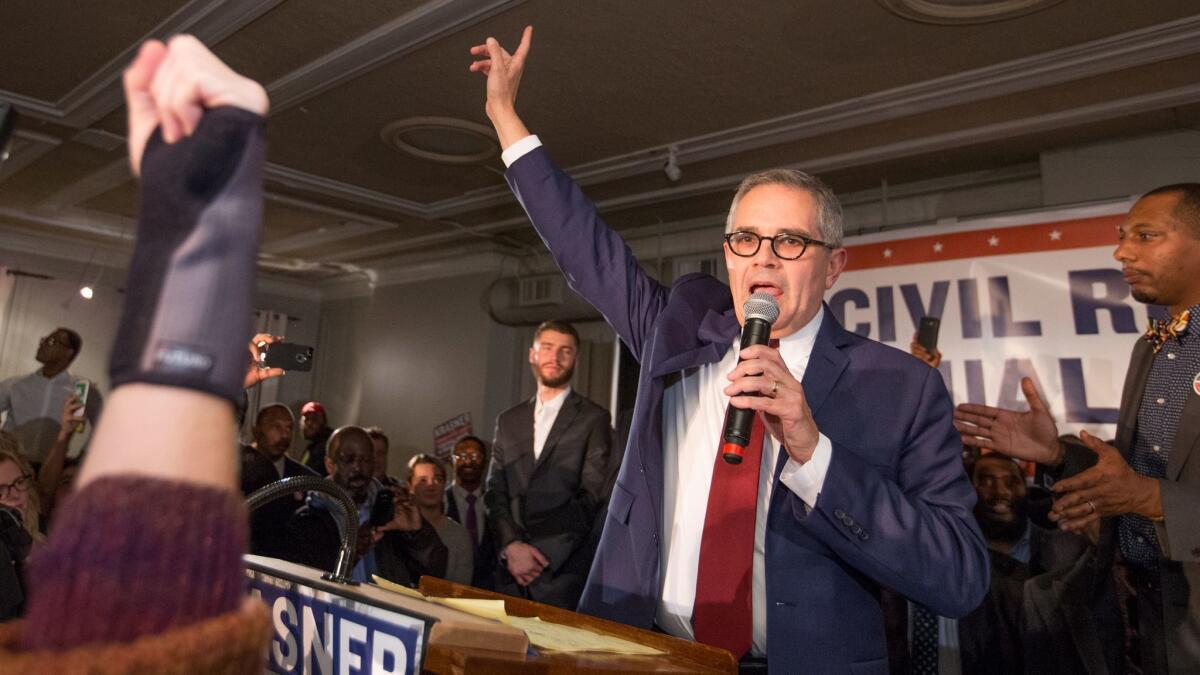Editorial: Philadelphia voters soundly reject Jeff Sessions’ storm-trooper approach to criminal justice

- Share via
As political observers consider the wave of Democratic victories across the country Tuesday and what it might mean for President Trump, it’s important not to overlook Philadelphia — where voters elected as their top prosecutor a criminal defense lawyer who campaigned on ending cash bail, the death penalty, civil asset forfeiture and the war on drugs.
Larry Krasner is not the only progressive elected district attorney in the U.S., but he instantly becomes one of the most visible, serving the nation’s 10th largest largest urban area. (Krasner’s jurisdiction, Philadelphia County, has the same boundaries as the city of Philadelphia.)
He also becomes the latest weapon in a voter rebellion of sorts against the backward-looking and counterproductive criminal justice policies put in place by U.S. Atty. Gen. Jeff Sessions since he took office in February.
For example, Sessions ordered his federal prosecutors to seek the toughest possible sentences — as opposed to the most just or the most rational. He brought back programs to transfer surplus military equipment (such as armored vehicles and grenade launchers) to police. He all but rejected the possibility that his department would take jurisdiction over law enforcement agencies that systemically violate civil rights. He called for reinstating programs under which police permanently seize, without a trial, property that was allegedly involved in crimes.
Larry Krasner’s election is a message from voters that they want to move more quickly on the road toward a sweeping overhaul of the justice system.
By contrast, Krasner is a frequent critic of police practices who vowed to make the justice system more just for the poor, for nonwhites and for other people who too often are punished out of proportion to their offenses, more often and more severely than those with money or privilege. His election gives a boost to a criminal justice reform movement that began in earnest just over a decade ago, after the fallout of the various foolish “wars” on drugs, on gangs and on crime.
He follows in the footsteps of reform-oriented prosecutors elected a year ago — on the same ballot, ironically, as tough-on-crime presidential candidate Donald Trump. Consider Kimberly M. Foxx, elected state’s attorney for Cook County, Ill., which includes Chicago. Or Kim Ogg, elected district attorney of Harris County, Texas, which takes in Houston. Or Aramis Ayala, state attorney for Florida’s 9th Judicial Circuit, which includes Orlando. They and a handful of others have correctly seen their role as not merely holding criminals to account, but exercising their prosecutorial discretion to prioritize the most serious crimes and ensure that the accused are treated fairly.
What about supposedly liberal California?
This state produces many leaders in the drive to make the justice system more just, but few of them are elected district attorney. As in most states, DAs here are elected by county, but county lines are not evenly drawn. A third of the state’s population lives in Los Angeles County, which has twice elected moderate-to-conservative Democrat Jackie Lacey. San Francisco and other Bay Area counties tend to elect more progressive prosecutors. But most California counties are geographically small and located in more rural parts of the state where voters lean farther to the right than the state’s population as a whole.
The result is that most California DAs (and sheriffs, who also are elected by county) are more attuned to old-school law-and-order approaches than to the criminal justice reforms overwhelmingly embraced by voters in a series of statewide elections.
It’s not simply that these officials tend to be more politically conservative. A strong criminal justice reform movement based on conservative principles is being advanced by elected officials in red states like Texas. Rather, many of California’s elected prosecutors seem trapped in the 1990s lock-them-up era.
Philadelphia, meanwhile, has long been a majority Democratic and liberal city and county served by police and elected district attorneys who didn’t reflect the majority population’s more progressive attitudes toward law and justice. Krasner’s predecessor, Seth Williams, cast himself as a reform-oriented district attorney but left many disappointed, even before his conviction on corruption charges.
Krasner is different from Williams, Foxx, Ayala and perhaps all of the others in that he wears his progressivism more openly, is more vocal and, reportedly, can be fairly abrasive. His lack of experience as a prosecutor will be taken as something of a thumb in the eye of the 300 lawyers in the office he will soon lead. His numerous lawsuits against the Philadelphia Police Department will most certainly be viewed disfavorably by cops, with whom his prosecutors must work. His election, though, is a message from voters that they want to move more quickly down the road toward a sweeping overhaul of the justice system. Let’s hope he can deliver.
Follow the Opinion section on Twitter @latimesopinion and Facebook
A cure for the common opinion
Get thought-provoking perspectives with our weekly newsletter.
You may occasionally receive promotional content from the Los Angeles Times.






